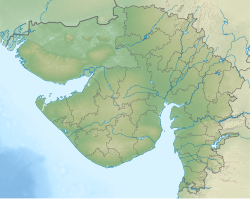The Magen Abraham Synagogue (Hebrew: בית הכנסת מגן אברהם, lit. 'Shield of Abraham Synagogue'; Gujarati: મેગન અબ્રાહમ સિનાગોગ) is an Orthodox Jewish congregation and synagogue, located in the Old Town neighbourhood of Ahmedabad, in the state of Gujarat, India. As of 2015[update], it was the only synagogue in the entire state.[1] It was built in 1934 using donations from members of the Bene Israel Jewish community of the state.
| Magen Abraham Synagogue | |
|---|---|
 The synagogue exterior, in 2007 | |
| Religion | |
| Affiliation | Orthodox Judaism |
| Rite | Nusach Sefard |
| Ecclesiastical or organizational status | Synagogue |
| Status | Active |
| Location | |
| Location | Bawa Latif Street, Old Town of Ahmedabad, Ahmedabad district, Gujarat |
| Country | India |
Location of the synagogue in Gujarat | |
| Geographic coordinates | 23°01′19″N 72°35′02″E / 23.0220282°N 72.583874°E |
| Architecture | |
| Architect(s) |
|
| Type | Synagogue architecture |
| Style | Indo-Judaic Art Deco |
| Founder | Bene Israel community |
| Funded by | Dr Solomon Abraham Erulkar |
| General contractor | D. V. Patel |
| Date established | 1848 (as a congregation) |
| Groundbreaking | 19 October 1933 |
| Completed | 1934 |
| Website | |
| magenabraham | |
History
editBene Israel Jews first arrived in Gujarat from Maharashtra in the mid-19th century; and the congregation was formed in 1848.[2][3]
The cornerstone of the synagogue was laid on 19 October 1933 by Abigailbai Benjamin Issac Bhonker. The synagogue was consecrated on 2 September 1934.[1] The synagogue stands on Bawa Latif Street, across the street from a Parsi Fire Temple at Bukhara Mohulla in Khamasa in the Historic City of Ahmadabad. It is included in the heritage list of the city.[1] The synagogue was named in honour of Dr. Abraham Erulkar, one of the first Jews to come to Ahmedabad and the father of Dr. Solomon Abraham Erulkar, who helped to fund construction of the synagogue.[2][3]
Designed by Daniel Samson and Ellis Abraham Bhinjekar, the synagogue was built in the Indo-Judaic Art Deco architectural form with marble chequered floors and a large ark.[3][4] The furniture consists of movable pews arranged around a central Bimah. The Ark contains multiple Torah scrolls of many sizes and in hard cases. The women's balcony is unusual, when compared to other Orthodox synagogues in India, in that it is not supported by pillars. The synagogue has Grecian pillars with triangular roof and high ceiling. There are several religious artefacts including artistic grills, stained glass windows and chandeliers.[1]
Community
editThe size of the Jewish community in Ahmedabad has reduced considerably since the 1980s, as many families made aliyah to Israel, or emigrated to the United States or Europe. In 2018, the Gujarat government granted minority status to Jews living in the state.[5][6] As of 2020[update], there were 120 members.[7]
The synagogue has a small and active community. Pesah and High Holy Days are observed annually.[3]
Notable members
edit- Reuben David, a veterinarian who founded the Kamla Nehru Zoological Garden, Kankaria; awarded a Padma Shri[8][9]
- Esther David, an author, artist, and sculptor and recipient of the Sahitya Akademi Award; daughter of Reuben David[10][11]
- Esther Solomon, a leading scholar in the study of Sanskrit; awarded a Padma Shri[2]
Gallery
edit-
The synagogue and adjacent markets, in 2012
See also
editReferences
edit- ^ a b c d John, Paul (13 April 2015). "Only synagogue in state enshrined in heritage list". The Times of India. Retrieved 1 January 2016.
- ^ a b c Klein, David Ian (Summer 2017). "Kabbalat Shabbat in Khamasa: The Jews of Ahmedabad". Contact. Steinhardt Foundation. Retrieved 10 November 2024.
- ^ a b c d "Gujurat - Magen Abraham Synagogue". Indian Jewish Heritage Center. 2014. Retrieved 10 November 2024.
- ^ Jafri, Furqaan. "Ahmedabad's Bene Israel Jewish Community: An Overlooked Minority". www.thecitizen.in. Retrieved 20 May 2022.
- ^ "Indian state of Gujarat gives Jews official minority status". Jewish News Syndicate. July 2018. Retrieved 10 November 2024.
- ^ "Jews in Gujarat will get minority status". The Times of India. 29 June 2018. Retrieved 10 November 2024.
- ^ Jain, Saudamini (25 April 2020). "India's Jewish 'Microscopic Minority' Feels Safe From the Coronavirus — for Now". Haaretz. Retrieved 20 May 2022.
- ^ David, Esther (25 April 2011). "Animal instinct". intoday.in.
- ^ "AMC to mark 100th birth anniversary of zoologist Reuben David today". Indian Express. Retrieved 24 February 2014.[dead link]
- ^ Weil, Shalva (2008). "Esther David: The Bene Israel Novelist who Grew Up with a Tiger". In Shulman, David; Weil, Shalva Weil (eds.). Karmic Passages: Israeli Scholarship on India. New Delhi: Oxford University Press. pp. 232–253.
- ^ Weil, Shalva (2012). "The Bene Israel Indian Jewish Family in Transnational Context". Journal of Comparative Family Studies. 43 (1): 71–80.
